You people like things that aren’t real, right? Of course you do! Especially imaginary cars, right? We got some Cybertruck fans out there, don’t we? I kid, I kid! You guys are all right. As you know we at The Autopian like to provide you with all the fictional automotive content you can stand, which, let’s be honest, varies a lot from reader to reader. This time our frustrated ’80s-era-trained designer, known only as The Bishop, is back, and he’s opened his Third Eye to a universe where the proto-SUV International Scout made it into the 1980s with a third version. Take whatever pills are handy and join us on this voyage of the mind!
First, in case you’ve somehow recently walked into a whirling ceiling fan and forgotten what an International Harvester (IH) Scout is, let’s do a quick refresher. International Harvester, as the name suggests, started as a farm equipment company, but moved into building trucks pretty early in the 1900s. They expanded to passenger cars with the Travelall, and then in the late 1950s decided they needed a competitor to the Jeep, which was riding its WWII fame to become a staple of off-road civilian life.
Originally conceived as a plastic-bodied car, the scout was designed by IH Chief Designer Ted Ornas, who came up with the final design in 1958 on his kitchen table, on a scrap of mat board.
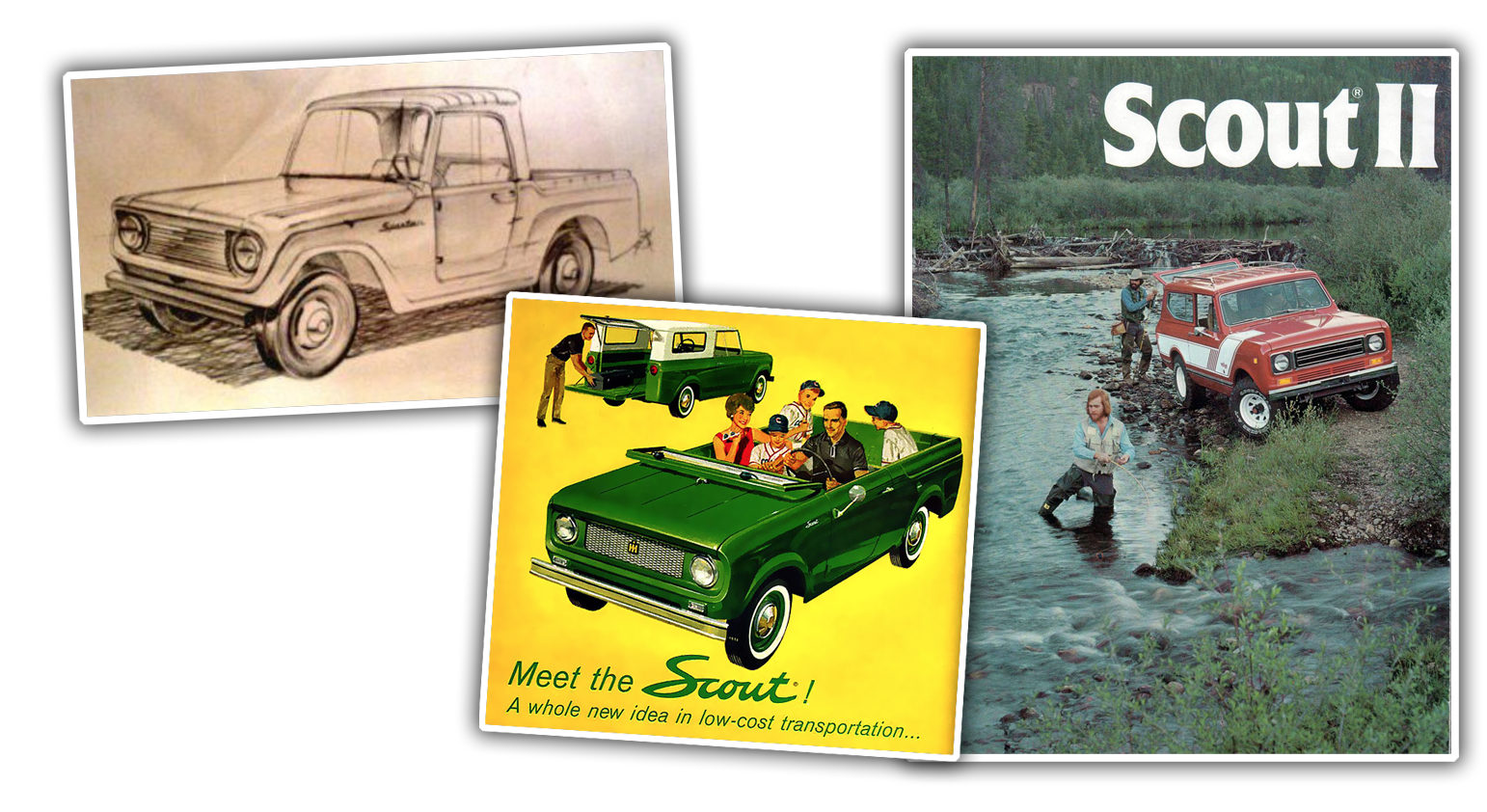
That sketch was approved, the project switched from plastic to steel, and by 1961 there were Scouts being sold. The Scout was a success, with a second-gen version, the Scout II, arriving in 1971 and lasting until the nameplate’s demise in 1980. Over half a million Scouts were sold over the years, making it likely IH’s best-known car.
In 1979, International built a concept car called the Supplemental Scout Vehicle (SSV) that pointed to the future direction of the Scout, except it, you know, didn’t have a future. 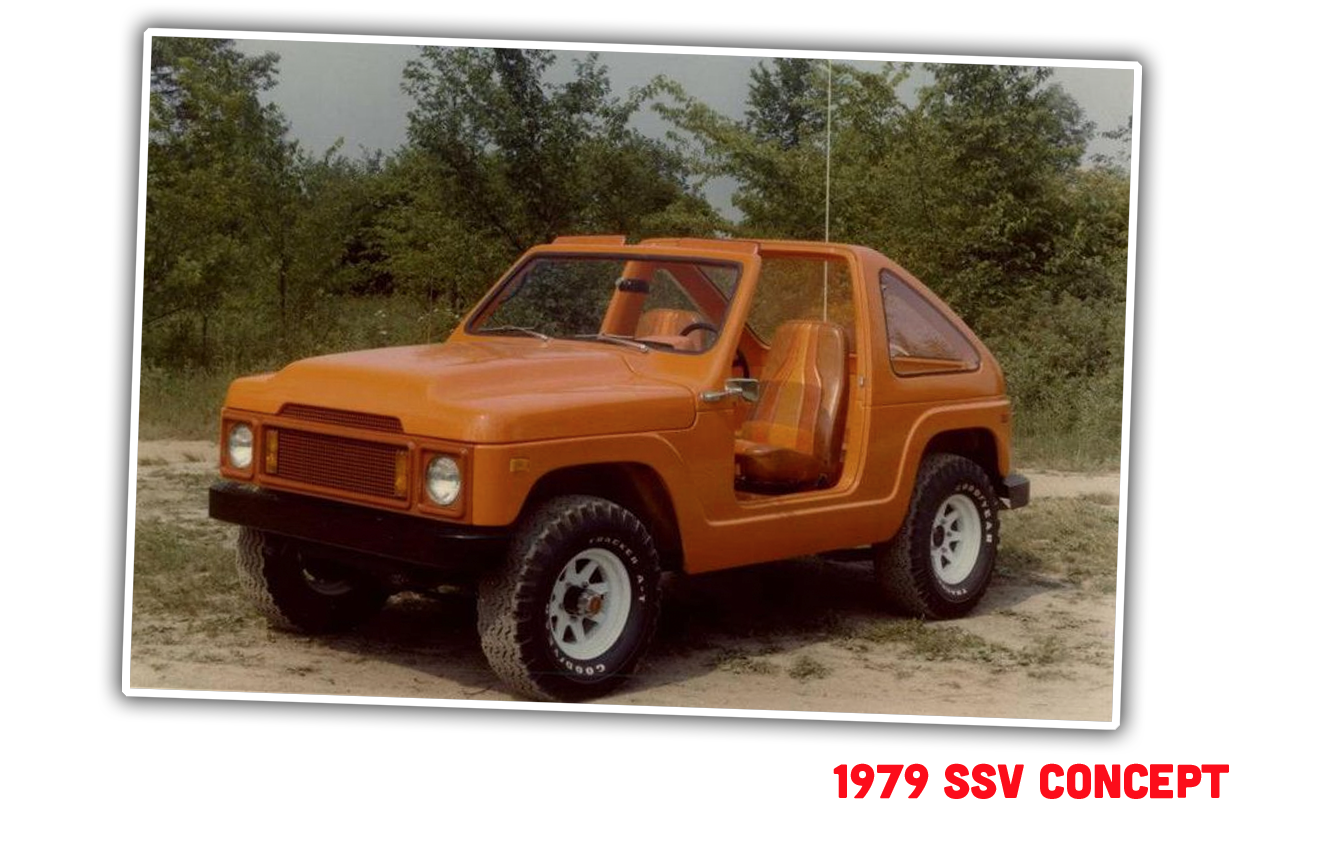
You can get a sense of where IH was thinking about going with the Scout which, interestingly, included a return to a non-steel body. Unfortunately, a number of factors including the increased demand for more fuel-efficient cars and IH needing to focus more on the product lines that actually made money, their trucks, caused the Scout program to be ended.
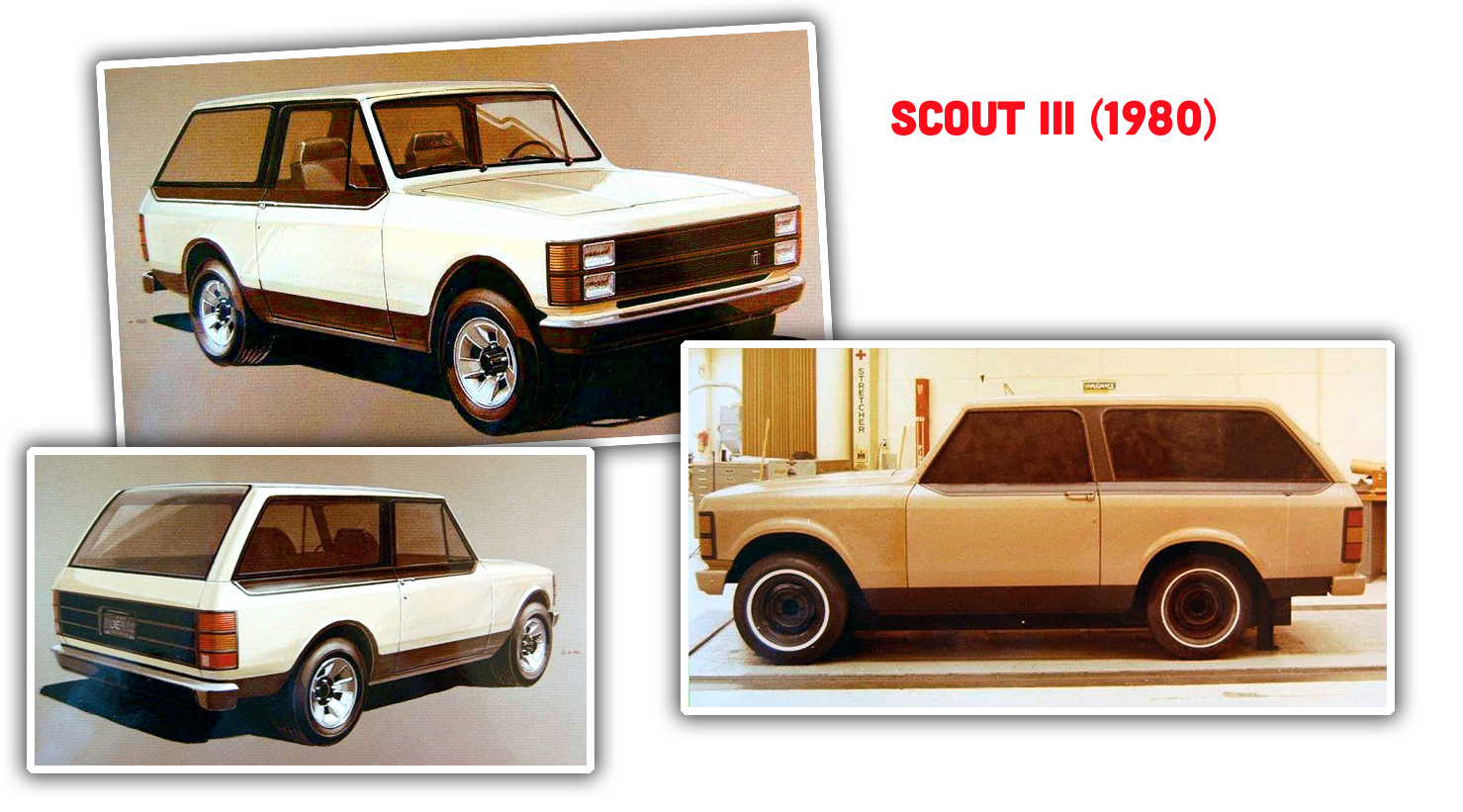
Before it ended, there were styling studies for an updated Scout III, but, of course these never happened.
And that’s where The Bishop comes in.
Our designer of Cars That Never Happened picks up the Scout story in 1987, when an all-new Scout was designed, with an emphasis on its off-road roots, and a design that seems to have been inspired by the 1979 SSV concept:
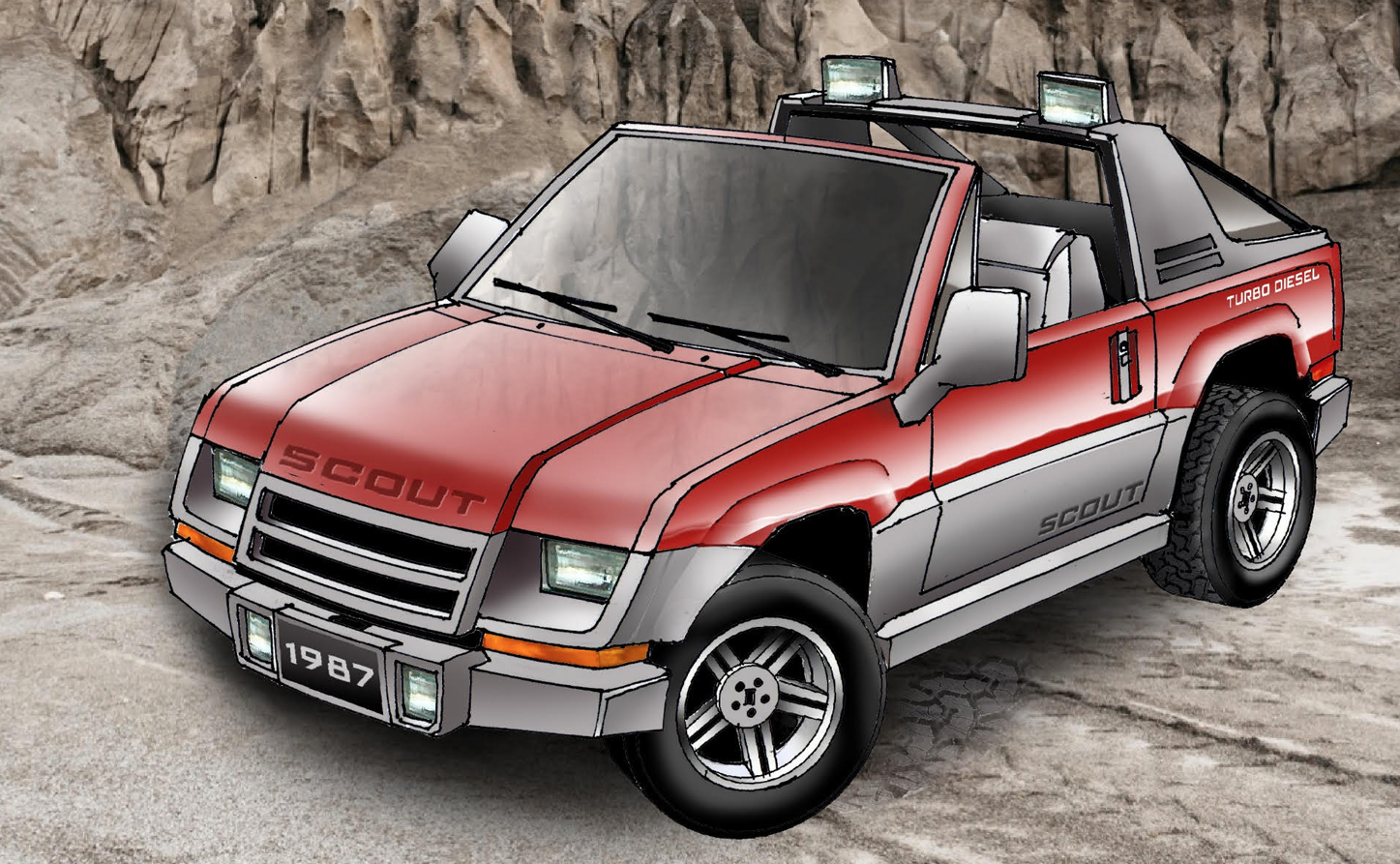
The rugged, unpainted lower-body cladding feels like the right choice for a car that’s going to get lots of off-road abuse, and I think the overall look certainly works in a late-’80s tough context. What I really like best about The Bishop’s ’87 Scout IV (?) design are all the clever details, though:

There’s a winch behind the front license plate, which folds down, and the idea of “folding” is carried throughout so much of the car: lights on the roll bar fold up, a bumper step folds down (also, I adore the use of a spare tire as an additional bumper element) and that rear fastback soft top folds up and out of the way, into the roll bar, in a very clever variant on the usual soft top theme.
Inside, at the rear–well, I guess it’s only sort-of inside, with the roof panel off and the soft top folded up–we have all kinds of other foldy goodness going on:

Those crank-operated roof lights! And look at the fantastic way the seats fold flat to form a cargo bed! It reminds me a bit of how the VW Thing’s rear seats folded down to make a cargo platform, just more refined:

Plus, the idea that you could remove the seat cushions to make a pair of enclosed storage bins? Brilliant.
Like all good off-roaders, the Scout should be able to shed its doors, easily, and The Bishop has come up with a very clever, tool-free method:
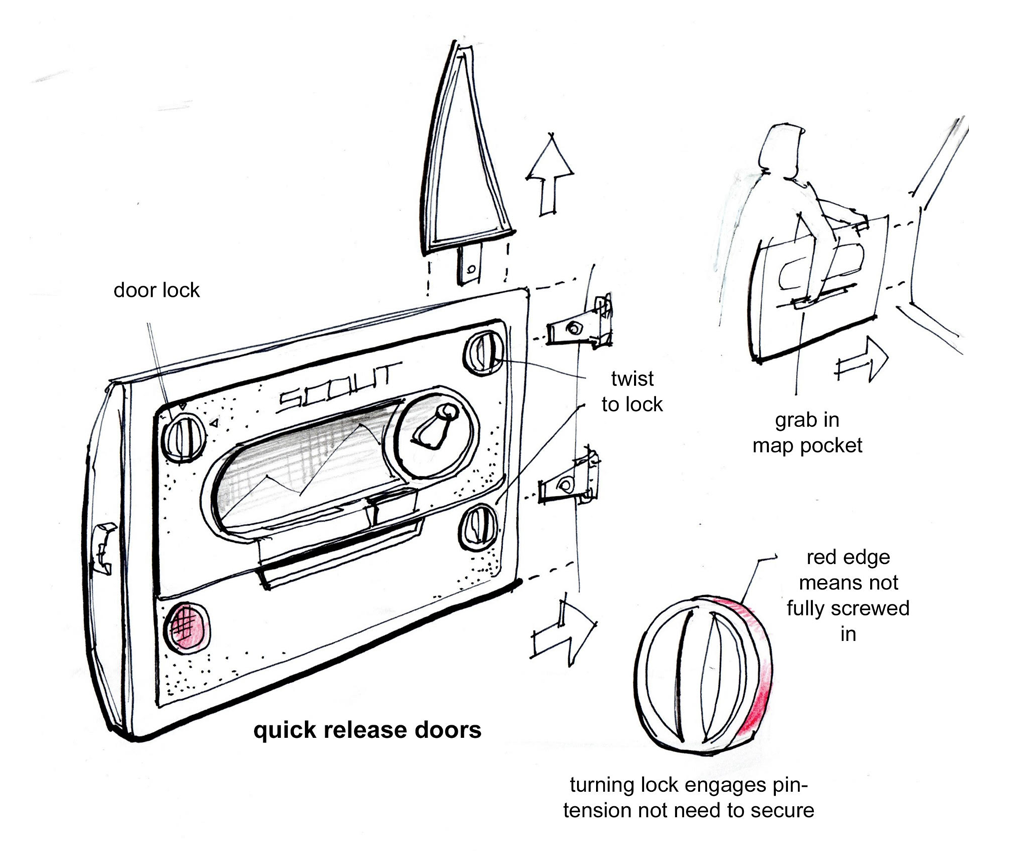
I suppose how well this all works is dependent on how much IH cheaped out or not on the materials; if those turn lock mechanisms are cheap plastic, these would become a nightmare, but if they’re actually metal, then we’ve got something here.
My favorite bit, though, might be this dash concept:
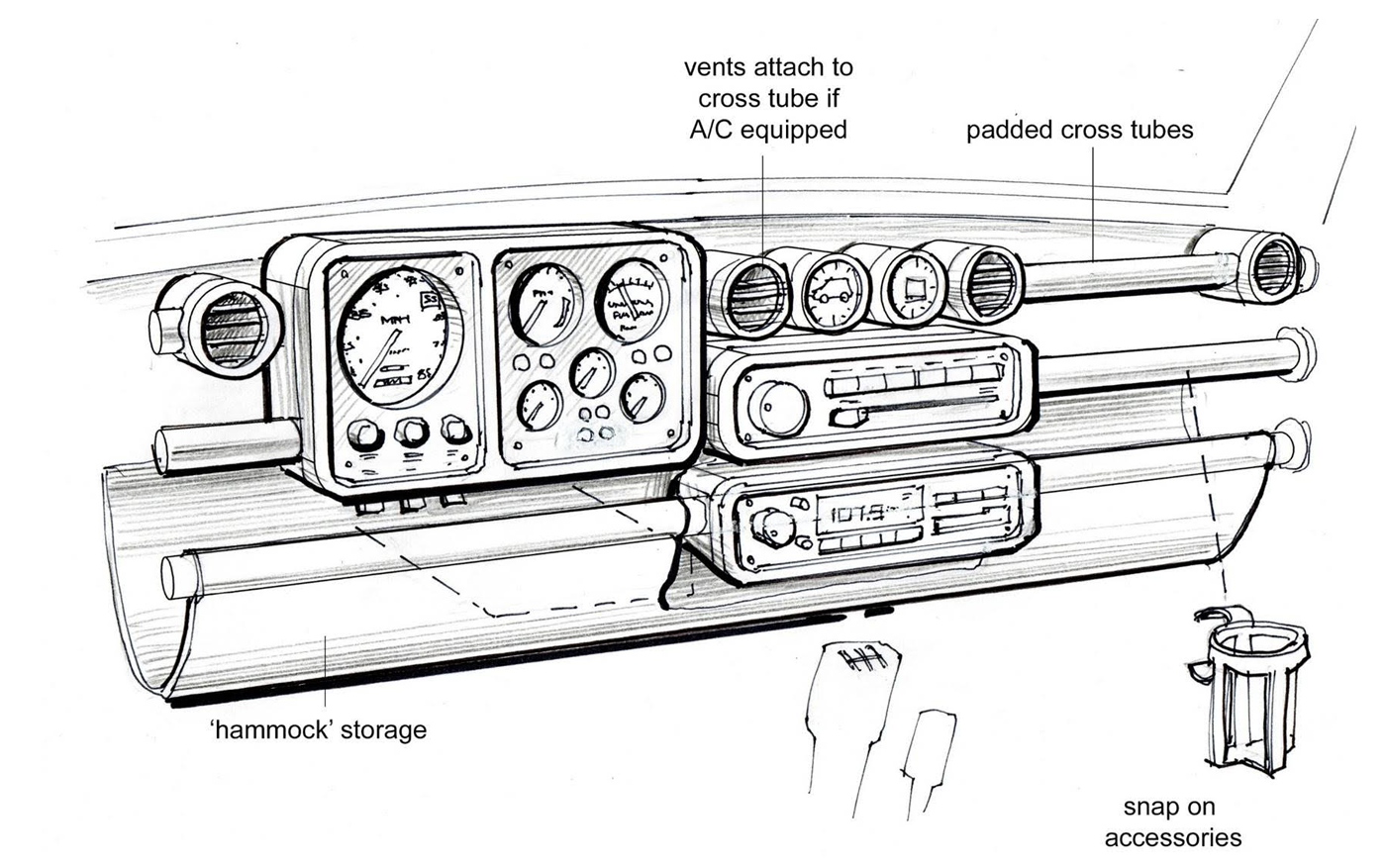
Those cross-beams would house separate instrument or radio or HVAC or vent units or whatever; if you have AC, then that top tube would be hollow, with ports for the vents. There’s a hammock-like thing that acts as a glove box for your stuff, too. Plus, the cross-bars would have a known diameter, so aftermarket companies could easily make clip/snap on accessories of all kinds.
It’s sort of like the dash design of a Fiat Panda, just a bit more industrial:

The Bishop’s feverish imagination went on to concoct a whole line of these Scout-based vehicles, including long-wheelbase replacements for the old Travelall and pickup trucks:

I especially like that drawer-like slide-out bed extender, which he sketched in more detail:
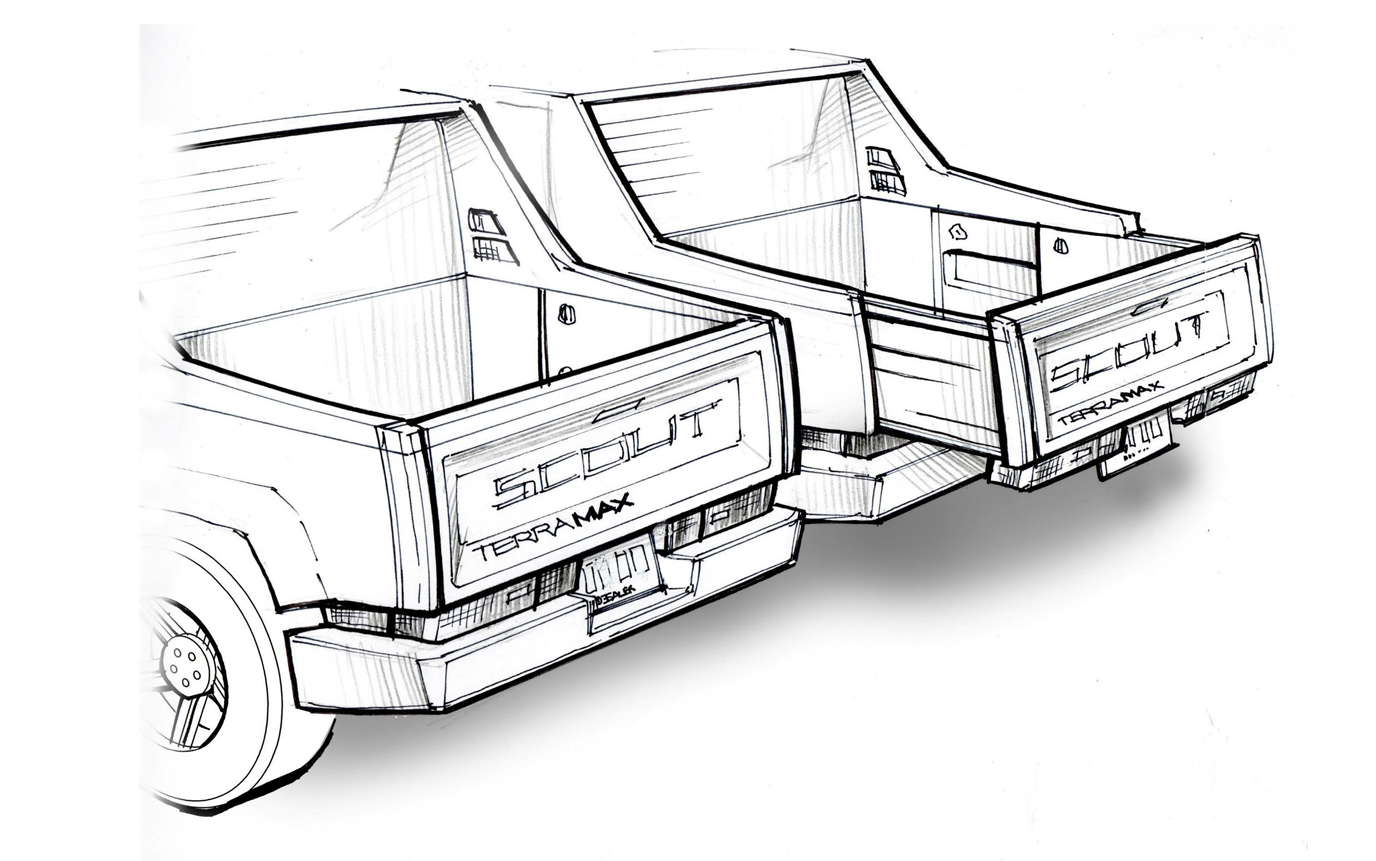
I guess maybe a fold-over section of the bed floor would flop backwards to make the floor of the extended portion? It seems pretty clever to me. Those taillights would need extendible wiring, though, and I could see that wearing out and being a constant pain once these things started getting old.
Regardless, this Scout That Wasn’t is full of some great ideas that I hope smart designers from major automakers are looking to steal as we speak.
More folding stuff on our SUVs, carmakers! It’s what the people want!




It’s all very nice with all these smart fold-out concept car features, but on an actually off road used offroader, they are going to break off. Make it more sturdy and simple instead.
Also try to imagine how much creaking noise it will make in the cabin, when the hard plastic of the “modular” pods rub against each other. It looks very cool, but a one pice dashboard with as few part as possible is just better. Take a lot at an old VW Beetle or a ten year old Toyota Aygo, for a lesson in simplicity.
I DO love the looks of the modular instruments, and it reminds me of something from the Alien 1979 movie. And I think it WOULD work in a spaceship floating through outer space. If the thrusters are not on full boost, the vibration in the cockpit would be minimal. Much unlike in an IH Scout.
In the Mk1 Panda, the only loose modular thing was the ashtray. It was made in the strange soft brown Fiat 80ies plastic and also mounted on the canvas covered bar holding the hammock tray, so vibrations were softened. But it was VERY cool, that it could slide from side to side to whoever was smoking at the time. The Panda also came with TWO folding canvas flaps in the roof!
As an interior geek, I really, really like the IP sketch up there. The whole possibility of being able to add/subtract modules and really unusual, but clever, storage is all sorts of cool.
These are very clever riffs off of the SSV, but had IH really kept up the end result might have looked more like a ZJ Grand Cherokee. Larry Shinoda (C2 and C3 Corvette, Boss 302 Mustang designer) had been consulting for IH in 79-80, was in the running to take over IH design in 1980 and did most of the ZJ Grand Cherokee design in 85.
Bishop, hat’s off to you for not going the other (bloated) way!
It looks like a good design and FUN!
This is only tangentially related to the topic, but I still think the Scout II is visually one of my favorite trucks of all-time, especially with those sweet stripes.
I came close to buying a relatively low-rust one off Craigslist a few years ago (probably about 1/4 of a Tracy) but I ultimately chickened out due to them being uncommon enough that I was afraid parts would be hard to find.
Can we all agree that, henceforth, the standard unit of measurement used to quantify the amount of rust on an automobile shall be called a “square tracimeter?”
Instead of being a fixed amount, the size of a square tracimeter would be dictated by and relative to the overall size of the vehicle in question, whose surface area in its totality would be made up of 100 square tracimeters. One hundred square tracimeters would equate to one “metric detre.” (David + Tracy + beater = detre).
I’m using the Queen’s English to spell “detre” so that the term is not confused with the transitive verb “deter” – although should you ever encounter a true metric detre, you should most certainly be deterred. A metric detre, the theoretical limit of vehicular rust, would be an automobile that is absolutely, completely, 100% covered in rust.
As an alternative to “square tracimeters,” I’d also be open to using the term “square datrameters.”
All those in favor, say “aye” or… ya know, gimme a thumbs up.
I mean, my initial thought was that you’d consider one “Tracy” as the average amount of rust on a vehicle that *he* would purchase, while the amount of rust on a car that any sane person would consider purchasing would be estimated as some percentage of that.
It goes without saying that you don’t want to consider taking on a project car that is *greater* than one Tracy, because then you’re in the territory of that one from the “60 for 60” video that someone had bolted on a length of angle iron as a “replacement” for part of the frame. It isn’t that cars *can’t* go >1 Tracy, it’s just that those that do are typically no longer on the road.
But if we want to be more scientific about it, your way sounds good too.
All I see is a Geo Tracker with the front end of a Dodge Shadow. Is 90’s retro becoming a thing?
This has all been done before…
https://en.wikipedia.org/wiki/Monteverdi_Safari
This is the true “Scout III” in my book. And it looks so good! If I had the cash, I’d import one. Yes to the similarity to a range-rover; not an accident, I think. (The Sarah is just as great, frankly.)
Meh. “Sahara.” Also, liked my own comment. Whoot. One Like!
THe Scout III concept looks very much like an early Range Rover. International would need to make a choice to chase volume or go for a more premium product. As they don’t do mass-market vehicles, there wouldn’t be any savings by sharing parts across a full lineup. However, International may have been able to go premium/rugged like Land Rover did. The Jeep Grand Wagoneer was declining in the late 80’s and a Scout with a premium appointment could have stolen some market share.
I wonder if International would have ditched the solids axles for better road characteristics.
To be honest, building a modern Scout wouldn’t be too hard. The business relationships to make it happen already exist. International (Navistar) currently builds the medium duty Silverado chassis for Chevrolet (4500, 5500, 6500). I’m sure that a deal could be made for GM to return the favor and build a few International-branded Scouts on whatever platform they chose. The sticking point of course is that GM already sells every SUV they can build.
Lol, GM can’t even build their own Bronco compeditor because they scrapped the next-gen midsize truck platform in favor of a refresh of the current trucks, which was determined to be incompatible with building a SWB SUV a’la Wrangler or Bronco. They’re certainly in no position to build a BOF midsize offroader for someone else.
This would be much cooler than the Bronco if it were real.
Just call me Fry because you can shut up and take my money.
Interesting, but I think maybe it leans a little too far toward the plastic-cladding fad of the 80’s and doesn’t take into account IH’s limited means. They were always a tractor-maker; if they’d been able to weather the 70’s and squeak into the 80’s I think their designs would lean a lot more toward basics, in that they were doing as much as they could with a tiny budget. I love all of the gadgetry here but I don’t remember the Big Three offering anything this whiz-bang until the 90’s—I’m thinking of Chrysler’s hideaway seats in their minivans, for example. My guess is that IH’s offering would skew more towards the Grand Cherokee model: maybe a new body shape, but variations on that same design until the early 90’s when their hand would be forced yet again by emissions and safety regulations.
The dash actually reminds me of a Be-1 or a Pao, a little bit, anyway. But, accurate, given those were also mid/late 80s designs
This is a fantastic series!!
Also, while we’re talking about International Harvester, I saw a Travelall at a car show recently with FOUR (4) fuel tanks: two in the rear, and one in each front fender. I can’t find many details online about this option. Any Autopians have any additional insight here?
Not sure about the dual rears, but I’ve got a friend restoring one now and his has an additional tank in the front passenger fender that was stock from the factory. Its own fuel cap and everything. I never knew I needed something more in my life.
I could see them offering them on both sides.
The fuel filler is in the front fender but the tank itself is farther back, under the cab along the side, essentially even with the front seat. My ’70 IH pickup has the same setup with dual tanks in the same positions on each side but for some reason the one on the left side has the fender-mounted filler whereas the one on the right side has the filler behind the door at about the same height as the side of the bed, in the position one would expect for a behind-the-seat tank. The two tanks themselves are otherwise mirror images of each other in terms of location underneath the cab, though. By the way, the fender-mounted fillers make a sharp bend just inside the fender, so at least for mine it’s impossible to fuel at anything but the slowest pump setting. I usually fill it from a gas can instead when I need it. In normal use I just run with the other tank.
There were also several options for additional rear tanks of different sizes and locations for the pickup and the Travelall as well, for anyone anticipating the need to carry serious amounts of fuel.
This is the content that helps me sleep at night. I always wondered how fillups worked with the gas cap so far down on the front fender.
My ’73 1210 392ci 4×4 Travellall had twin 20 gal tanks on the sides and a 35 gal in the center in the rear, factory installed. Two fillers on the left and one on the right if I recall.
The 35 drained into the 2 20s so it took a long long time for the gas gauge to move (I think is was balanced). But once it started moving, it moved good.
8 mpg uphill, downhill, tailwind, headwind, empty, full or towing.
As a former owner of a 1977 Terra, I love this.
The bottom left sketch is a short-wheelbase 2-door traveller ( not a long-wheelbase).
maribert- the Bishop here. The Traveller 2 and 4 doors would both be on the longer wheelbase with more permanent rear seats (you can see that the 2 door has a two part rear quarter window). The Travellers would be more mom-and-the-kids oriented than the short wheelbase versions.
I see a real similarities between this and the Isuzu Amigo.
Extendible wiring? Please Torch, let the engineers handle that portion.
First place my mind goes to is something similar to a slip ring commutator like you’d find in most cranes. Slide instead of a ring, and enclosed to protect it from the elements. That’s first thoughts though.
Mr. Asa- my first thought would be no moving wires but two sets of electrical contacts; one for extended format and one for standard format. This system would not be without possible issues either…but then the whole system would have a bunch of challenges to overcome to work. But we put a man on the moon didn’t we? Or at least fake it real good?
So it would kind of unplug itself then plug itself back in when you moved it from one position to the other? I thought of that as well, but I’d bet that body twist from offroading would eventually cause an issue there. As you said, nothing that couldn’t be overcome without some planning.
Maybe some fancy magnetic plug on one end that would auto-align?
If the extendo-bed side was a hollow box (which I’d expect for stiffness), you could mount the wiring harness to a folding arm. One end would be anchored to the non-moving body, one would be mounted to the movable bed section, and there’d be a hinge in the middle. By locating the attachment points of the arm correctly you could prevent the harness from being bent in half, and you could keep the arm from being straightened out completely. This would allow you to select the correct wire, radius of curvature, etc to ensure sufficient life. It would also give techs a place to splice in a repair after 15 years of flexing.
I was thinking of an old style telescope, no lens run the wire through and it extended or collapsible and protects the wires.
I remember getting some junk from Xerox (my mother was an engineer there) and they had a gizmo for extendable wiring on paper trays. The wires were arranged in a flat loom that was rolled up on a spring loaded unit. It would stretch and then return. I wish I could find a picture.
It just looks like a lifted Dodge Rampage….mmmmm rampage
Loved the Rampage, always wanted one!
I do not understand why in 2022 truck beds are as inflexible as they are, in regard to the dimensions. The midgate with the fold-down seats coupled with the rear slide-out tailgate should be on every unibody pickup there is. But none of them have those features strangely – until the 2024 Avalanche/Silverado EV shows up.
I’d also love to see a rigid aluminum bed cover that goes straight up and down (via electric motor) mounted to 2” square pipe that periscopes up out of the stake pockets in each corner of the truck bed. I’ve wanted this for years, along with the tailgate slide-out or something similar pictured here. And fold down bedsides – or side gates, if you will.
I’m going to mock the concept up in SketchUp and report back in a few days. Stay tuned.
Remember Torch losing out on the Frunk. Patent that shit!
Might already be too late considering you posted on a public space
3 ideas that may fill a small need but I don’t think you could get the concept to work with all 3 options together. And I say this with all the confidence of someone with no real working knowledge.
For domestic Body on Frame there were 4 (now 3, as you don’t see much short frame based models) frame sizes and the manufacturer would base configurations or variations almost as follows:
Short frame: very short wheelbase or 2 door SUV (old Blazer) or regular cab pickup with short bed (5-2/3 ft).
Medium frame: 4 door short wheelbase SUV (Tahoe), regular cab pickup with standard bed (6-1/2 ft.) or extended cab with short bed
Long Frame: 4 door long wheelbase SUV (Suburban), regular cab pickup with long bed, extended cab with standard bed, crew cab with short bed
Extra Long or Heavy-Duty: extended cab pickup with long bed, crew cab with standard bed and duallys
I like the idea, but are truck beds all that true and straight? I think there may be some issues keeping the poles parallel.
I really want the extendo-bed version. If you could convince an automaker to make it, I would greatly appreciate that.
All the gadgets are great but for every slide, bend, extended doodad you got the high probability of the DT gremlin, RUST. Also while I love all the bishops work I often see later options being worked into designs far too early. For example the plastic cladding I can’t recall being used in the 70s or 80s and if so I doubt a shoestring IH would be the originators of such an idea.
Dave- I do know that the grey cladding appeared regularly beginning in the early 1980s on examples such as Mercedes (the w126 in particular), the Renault 5 and Espace, Matra Rancho, and many more, but admittedly it wasn’t as prevalent as it was in the next decade. I absolutely agree that a number of the things I’ve shown in these concepts are a bit early, to say the least (and would they work?). However, I’m glad that you like the ideas so far!